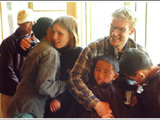
For their work in setting up a Tibetan rehabilitation and training center for the blind, Sabriye Tenberken and Paul Kronenberg, a couple respectively from Germany and the Netherlands, are well known and respected by the people in Lhasa, capital of southwest China's Tibet Autonomous Region.
To many people's surprise, Sabriye herself lost her sight when she was twelve. With her husband's help, however, she has helped more than 30 visually-challenged Tibetan children find hope in their dark world since 1998.
"I caught an eye disease when I was nine years old and it became worse when I was 12 and I almost couldn't see anything," said Sabriye, who was later sent to study in a special school for the blind.
"That was a really tough time for me. But living and learning with other children just like me, I gradually realized that an eye defect is not something that cannot be overcome," said Sabriye, who finally not only completed the study in the special school but also entered a university in Bonn, majoring in central Asia studies.
"Just because you are blind, you are not stupid and your hands are not useless" -- that was the belief Sabriye gradually adopted, which now she is trying to convey to her Tibetan students.
In 1997, Sabriye came as a tourist to Lhasa, where she met her life-long companion, Paul, as well as some local children who were suffering from the same experience she did in her childhood.
"Since then, I made a decision to stay here and help these children to have education," she said.
One year later, Sabriye and Paul gave up their jobs and settled down in Lhasa. In May of 1998, the couple set up a small special school for local visually impaired children.
At the beginning, there were only six students aged from six to twelve, who Sabriye and Paul finally found from several remote counties in Tibet.
"Before 1998, Tibet had not set up a school specially for visually impaired children," according to Wangqen Geleg, deputy director-general of the Tibetan association for the disabled. "The foreign couple's action has inspired those who are engaged in the disabled relief work in Tibet."
In 2000, with the support of Braille without Borders, an international charity organization for the blind, and a Tibetan association for the disabled, Sabriye and Paul established the Tibetan Rehabilitation and Training Center for the Blind and the students increased to 30.
Entering the center, people are surprised to find out that all the students can fluently speak three languages -- Chinese, English and Tibetan.
In a classroom, Dainzin and his classmates are learning massage skills.
Dainzin said that he has been learning massage for nearly three years and the center was helping them to set up a massage clinic.
"Because they can not see anything, it is more important for them to master some skills. This lets them know they have the ability to develop the responsibility towards themselves and towards society," said Sabriye.
In the center, the children not only receive the same basic education as they would in the ordinary primary and middle schools in Tibet but also have some professional training, like massage, playing musical instruments and weaving, which are suitable for the visually-challenged people.
Chilai, a 13 year-old boy who has loved music since his childhood, was reluctant to communicate with others in the early days after he came to the center. No more than three months later, however, he and another three children became "super singing stars" after being taught by the center's professional music teacher.
In addition, several students graduated from the center in June of this year and stepped on the way to the next stop of their life, according to Wangqen Geleg.
Among the graduates, Yoindain and four other children, who are more proficient in English listening and speaking, went to study in a normal school this year.
Another two brothers, Doje and Qamba, who used to live on the local government's relief fund, have just opened a teahouse at their hometown after two years training in the center.
"The villagers were surprised and we feel proud and confident. And we would like to say 'thanks' to the center, and especially, to Sabriye and Paul," said the brothers.
For their prominent contribution to the project of assisting the visually impaired people in Tibet, Sabriye and Paul were awarded with knight medals from the Queen of the Netherlands by the Netherlands ambassador to China, who made a special trip to Lhasa on Oct. 6 of this year.
"We are content with our life here because we are doing a meaningful job we love," said the couple.
(Xinhua News Agency October 30, 2003)
|

